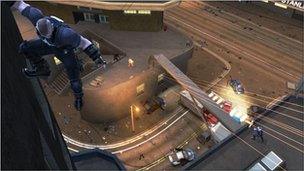Scottish games industry 'has lost fifth of jobs'
- Published

Realtime Worlds was put into the hands of administrators in August
Scotland has lost nearly a fifth of the jobs in its computer games industry so far this year.
The figure comes from the video games trade association, TIGA, which said this could be reversed with tax breaks.
The snapshot of the industry, which is focussed on Dundee, concludes there are 650 people working for 46 games development businesses in Scotland.
This has fallen 18% this year, mainly due to the collapse of Realtime Worlds, one of the larger employers.
Part of the Dundee-based company has been sold on to an unnamed US firm, but most of it remains in administration, following redundancy for nearly 200 staff.
The value of the industry to the Scottish economy is estimated at £30m per year, contributing £67m to UK national income.
The TIGA lobbying paper highlights the large proportion of highly qualified people in computer games, exporting their output around the world, including Firebrand Games in Glasgow, at which all the turnover is in exports.
Industry inquiry
The figures have been released ahead of a visit to Dundee by the House of Commons' Scottish affairs select committee. It has begun an inquiry into the video games industry, and will be holding a public meeting at the University of Abertay.
That will look at a university plan to provide £5m funding for prototype games, which it is reckoned could create 30 new companies and 400 new jobs.
Successful applicants receive £25,000 to help build a prototype game and prepare it for a pitch to investors.
The industry has been calling for reinstatement of a planned games tax relief, announced by former Labour Chancellor Alistair Darling in his final Budget, but then reversed when George Osborne delivered the first Budget of the coalition administration at Westminster.
It is claimed that the tax relief, in response to similar tax breaks in competitor countries such as Canada, could secure 273 jobs, £37m in investment and it could generate £34m in tax revenues over five years.
Colin Anderson, TIGA board member and MD at Denki in Dundee, said: "The video game industry has been at the forefront of digital technologies and post-industrial business methods in Scotland and the UK as a whole for around two decades.
"In that time it has taught an entire generation of workers the skills our economy will be founded on in future.
"However, now the Scottish and UK video games industries are at a competitive disadvantage. Many of our competitors have tax breaks for games production. We do not."
He said tax relief would give an incentive for investors to place projects and studios in Scotland and the UK, while without support it will be harder to attract talent and investment.
- Published6 September 2010
- Published24 August 2010
- Published17 August 2010
- Published22 June 2010
- Published22 June 2010